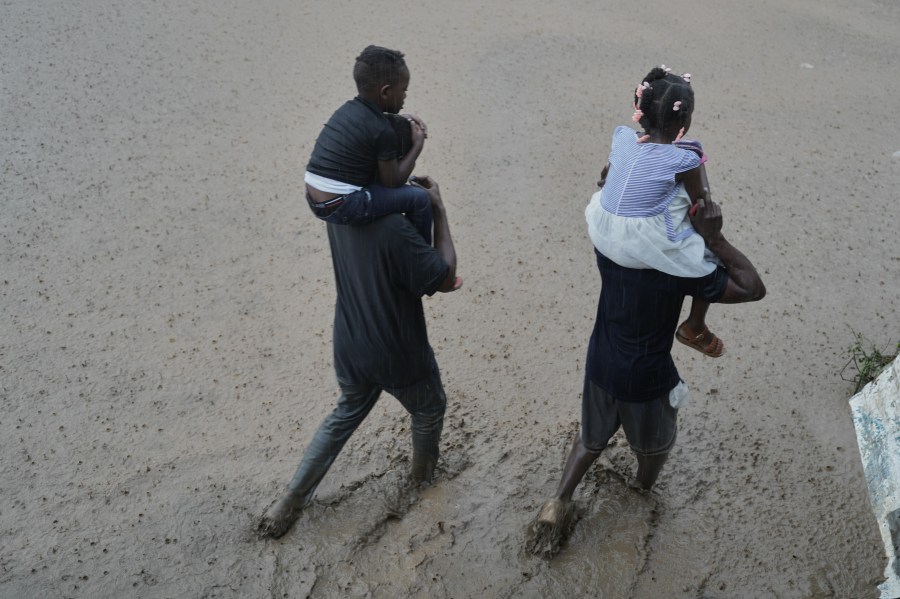Top Stories
Hurricane Melissa’s Destruction Intensified by Climate Change

UPDATE: New analysis confirms that climate change significantly intensified Hurricane Melissa, leading to devastating winds and rain across the Caribbean. The study, released today by World Weather Attribution (WWA), reveals that human-caused climate change increased Melissa’s maximum wind speeds by an astonishing 7% and made rainfall 16% more intense.
Melissa, one of the most powerful Atlantic hurricanes this year, wreaked havoc across Jamaica, Haiti, Dominican Republic, and Cuba, resulting in numerous fatalities and widespread destruction. The storm’s peak sustained winds reached an alarming 185 mph (298 kph), leading to roofs being torn off homes, hospitals damaged, roads blocked by landslides, and crops devastated.
The WWA’s rapid analysis indicates that the conditions fueling Melissa were six times more likely due to climate change compared to a pre-industrial world. Ocean temperatures in the storm’s path were reported to be approximately 1.4°C (2.5°F) warmer, providing additional energy that intensified the storm’s impact.
“The warmer the ocean temperatures, the greater the wind speed a hurricane can have,” stated Theodore Keeping, a climate scientist associated with WWA. He emphasized that, without climate change, Melissa’s wind speeds would have been 10 mph (16 kph) less intense, suggesting a lower potential for destruction.
Hurricane Melissa is the fourth storm this season to experience rapid intensification, defined as an increase of at least 30 knots (about 35 mph) in maximum sustained winds within 24 hours. This trend is alarming, as experts link such rapid intensification to climate change, driven by human activities that increase atmospheric temperatures and ocean heat.
Brian Tang, a professor of atmospheric science at the University at Albany, commented on the analysis, noting that the correlation between stronger winds and increased damage is a crucial area of research. “It’s like basically taking a sponge and wringing it out, and climate change is making that sponge even larger,” Tang explained.
Andrew Dessler, a professor of atmospheric sciences at Texas A&M University, added that the findings align with existing research about climate change’s effects on tropical storms. “This is completely consistent with our expectation of what’s going to happen in the future,” he said.
The urgency of these findings is underscored by the immediate impact on affected communities, where emergency responses are underway to address the widespread destruction. The rapid attribution analyses provide critical insights shortly after catastrophic weather events, helping to clarify the role of climate change in shaping their intensity and damage.
As the Caribbean begins recovery efforts, the implications of Hurricane Melissa’s devastation serve as a stark reminder of the urgent need for climate action. The findings from WWA not only highlight the current reality but also signal what future storms could look like if climate change continues unchecked.
Stay tuned for further updates on the recovery efforts and the ongoing implications of Hurricane Melissa’s destructive path.
-

 Science3 weeks ago
Science3 weeks agoInterstellar Object 3I/ATLAS Emits Unique Metal Alloy, Says Scientist
-

 Politics3 weeks ago
Politics3 weeks agoAfghan Refugee Detained by ICE After Asylum Hearing in New York
-

 Business3 weeks ago
Business3 weeks agoIconic Sand Dollar Social Club Listed for $3 Million in Folly Beach
-

 Health3 weeks ago
Health3 weeks agoPeptilogics Secures $78 Million to Combat Prosthetic Joint Infections
-

 Lifestyle3 weeks ago
Lifestyle3 weeks agoJump for Good: San Clemente Pier Fundraiser Allows Legal Leaps
-

 Science3 weeks ago
Science3 weeks agoResearchers Achieve Fastest Genome Sequencing in Under Four Hours
-

 Science3 weeks ago
Science3 weeks agoMars Observed: Detailed Imaging Reveals Dust Avalanche Dynamics
-

 Health3 weeks ago
Health3 weeks agoResearcher Uncovers Zika Virus Pathway to Placenta Using Nanotubes
-

 World3 weeks ago
World3 weeks agoUS Passport Ranks Drop Out of Top 10 for First Time Ever
-

 Entertainment3 weeks ago
Entertainment3 weeks agoJennifer Lopez Addresses A-Rod Split in Candid Interview
-

 Business3 weeks ago
Business3 weeks agoSan Jose High-Rise Faces Foreclosure Over $182.5 Million Loan
-

 Top Stories3 weeks ago
Top Stories3 weeks agoChicago Symphony Orchestra Dazzles with Berlioz Under Mäkelä








